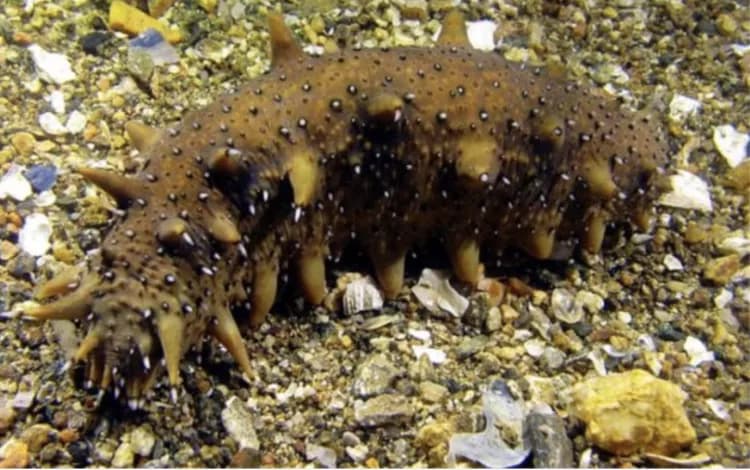
The Sea Cucumber Genome Points To Genes For Tissue Regeneration
A new high-definition genome sequence of the sea cucumber provides molecular insights into its ability to regenerate, according to a new study publishing 12 October in the open access journal PLOS Biology by Xiaojun Zhang, Lina Sun, Hongsheng Yang and Jianhai Xiang, of the Institute of Oceanology, Chinese Academy of Sciences, and colleagues. The genome sequence also helps explain why the sea cucumber has such a radically different skeletal structure from other members of the echinoderm phylum, and may be useful for understanding evolution of the animal kingdom.
Sea cucumbers form one class of the echinoderms, a phylum that also includes sea urchins and sea stars ("star fish"). Echinoderms and chordates (a closely related phylum that includes humans) share a feature that distinguishes them from most other animals: they are so-called deuterostomes, in which the anus, rather than the mouth, forms first in development. Sea cucumbers are unique among echinoderms in not having a hardened calcium exoskeleton, and in their capacity to regenerate damaged or lost body parts and viscera to a much greater extent than sea urchins or sea stars.
To explore the genetic underpinnings of these features, and to better understand the evolution of the deuterostomes, the authors performed high-definition genomic sequencing of the sea cucumber Apostichopus japonicus (also known as the Japanese sea cucumber), covering about 92% of its estimated 880 megabases of DNA, including more than 30,000 genes.
By comparing the genome of A. japonicus with that of other organisms, the authors found evidence that the echinoderms diverged from hemichordates (a small group of marine deuterostomes that includes the acorn worms) about 533 million years ago and the sea cucumbers split off from other the echinoderm classes about 479 million years ago. The authors showed that while the sea urchin genome includes 31 genes for biomineralization, critical for forming a calcified skeleton, the sea cucumber has only seven such genes. They also found that the sea cucumber expressed these biomineralization genes at much lower levels throughout development, likely accounting for their softer bodies compared to sea urchins.
As a strategy to scare off predators, sea cucumbers can expel their viscera, which they can then regenerate within several weeks. The authors found a group of duplicated genes, called PSP94-like genes, that were specifically expressed in the regenerating intestines of the sea cucumber, which had no corresponding genes in other echinoderms, suggesting that these genes may be crucial to the animals' ability to quickly regrow their viscera. A second group of genes, called fibrinogen-related proteins, were also duplicated and highly expressed during regeneration, indicating they likely contribute to this ability as well.
"The sea cucumber is a particularly promising model animal for regenerative medicine," said Xiang, and the availability of its genome should aid efforts to study the biology of regeneration and determine if echinoderm regrowth can offer insights that can be applied to human medicine. "Our findings should also facilitate the understanding of the requirements for sustainable utilization and effective breeding of echinoderms, in support of the high-value sea cucumber industry," which includes its use as a source of food and traditional Chinese medicine.
Materials provided by PLOS. Note: Content may be edited for style and length.
Disclaimer: DoveMed is not responsible for the accuracy of the adapted version of news releases posted to DoveMed by contributing universities and institutions.
References:
Xiaojun Zhang, Lina Sun, Jianbo Yuan, Yamin Sun, Yi Gao, Libin Zhang, Shihao Li, Hui Dai, Jean-François Hamel, Chengzhang Liu, Yang Yu, Shilin Liu, Wenchao Lin, Kaimin Guo, Songjun Jin, Peng Xu, Kenneth B. Storey, Pin Huan, Tao Zhang, Yi Zhou, Jiquan Zhang, Chenggang Lin, Xiaoni Li, Lili Xing, Da Huo, Mingzhe Sun, Lei Wang, Annie Mercier, Fuhua Li, Hongsheng Yang, Jianhai Xiang. (2017). The sea cucumber genome provides insights into morphological evolution and visceral regeneration. PLOS Biology. DOI: 10.1371/journal.pbio.2003790
Related Articles
Test Your Knowledge
Asked by users
Related Centers
Related Specialties
Related Physicians
Related Procedures
Related Resources
Join DoveHubs
and connect with fellow professionals

0 Comments
Please log in to post a comment.